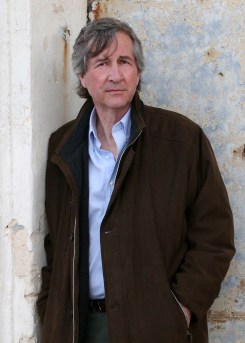 The 2016 presidential election has sparked all kinds of debate across the country. Several authors have already chimed in, writing about either side of the argument in their books. . . but none have gone quite as far as D.W. Buffa, author of the politically-charged new thriller, Necessity, which asks the controversial question: If the president were to ever become a traitor to the American people and their interests, what should happen to the person who puts an end to it?
The 2016 presidential election has sparked all kinds of debate across the country. Several authors have already chimed in, writing about either side of the argument in their books. . . but none have gone quite as far as D.W. Buffa, author of the politically-charged new thriller, Necessity, which asks the controversial question: If the president were to ever become a traitor to the American people and their interests, what should happen to the person who puts an end to it?
Buffa agreed to go on the record on the record as part of our Five Questions segment, and I asked him about everything from what kind of research he did for this book to where he’ll be taking Joseph Antonelli in future books.
Read the Q&A below, then make sure to order your copy of Necessity, in stores everywhere today, Tuesday, April 24th.
TRBS: Necessity offers a brilliant scenario, which in truth is something I had never really thought about. Several U.S. presidents have been murdered, but none of the killers have ever stood trial. . . until now, in your book! How did you come up with the plot idea for this book, and how much research did you have to do before sitting down to write it?
Buffa: Almost from the moment the election of 2016 was decided, there was talk that something would happen, that the president would never serve out his full term.
TRBS: This is your first Joseph Antonelli since, I believe, 2005 (Trial by Fire). Why bring him back for Necessity, rather than write it as a standalone with new characters?
Buffa: After seven Antonelli novels, I wrote Evangeline, and then The Dark Backward, in both of which I used a different lawyer, William Darnell, because I wanted someone old enough to remember certain things about the Second World War. And then, after that, beginning with Helen, which is set in ancient Athens, I wrote some historical fiction in an attempt to show something of the way in which the world, and the way we think about it, has changed. When I decided to write Necessity, I thought there would would be a good reason to have both the crime and the trial take place in San Francisco.
Buffa: It is certainly not impossible to write about the courtroom without having been a trial lawyer. The best courtroom drama ever put on film is Witness for the Prosecution, written by Agatha Christie. But it would have been impossible for me to have written Necessity, or any of the other legal thrillers had I not had that experience. There is nothing like it. You can watch trials, and you can read about trial tactics and trial procedure; you can get a sense of what makes one lawyer better, more persuasive than another; but you cannot know what it feels like, how quick your mind can work, when before a witness is three words into her answer you know not only what the rest of the answer is going to be, but the next question you are going to ask.
TRBS: Now that Antonelli is back, can your fans expect to see him again after this book?
Buffa: Antonelli will be back, not in the next novel, but in the one after that. The next novel, The Forty Fifth, follows Necessity, and is the third novel in a trilogy about the 2016 election. It is the story of what might have happened if someone, a conservative in the classic sense who understood the power of language and wanted to restore the predominance of public, as opposed to private, interest, had been elected. The Antonelli novel is called The Privilege because a new client, once he has the protection of the lawyer-client privilege, confesses to Antonelli that he is responsible for a murder for which Antonelli is defending someone else at trial, a trial Antonelli has no chance of winning.
TRBS: Lastly, who are some of your favorite authors, and which books are currently sitting on your nightstand?
Buffa: Two of my favorite authors, both of which I have been rereading, are F. Scott Fitzgerald and Jorge Borges. Fitzgerald’s The Great Gatsby, which I read for the first time between midnight and four in the morning the night before I left for a summer in New York after my first year in graduate school, a summer in which, because of that novel, seeing everything through Gatsby’s eyes, I kept wondering if I would ever meet a girl that, in Fitzgerald’s marvelous and unforgettable phrase had “a voice like money.”
The short stories of the Argentine writer Jorge Borges, who could put into the mouth of a character of his invention a line I have never been able to forget – “I have often begun the study of metaphysics but have always been interrupted by happiness” – say more in ten pages than most authors could say in a thousand.
What is sitting on my nightstand? The Roman History of Ammianus Marcellinus, written in the fourth century by a Roman general who, among other things, served under Emperor Julian. It is not my fault. It was one of Julian Drake’s favorite books, and Julian Drake, you will learn if you read The Forty Fifth when it comes out next year, only read interesting things.
Praised as “one of today’s finest book reviewers” by New York Times bestselling author Gayle Lynds, Ryan Steck (“The Godfather of the thriller genre” — Ben Coes) has “quickly established himself as the authority on mysteries and thrillers” (Author A.J. Tata). He currently lives in Southwest Michigan with his wife and their six children.
